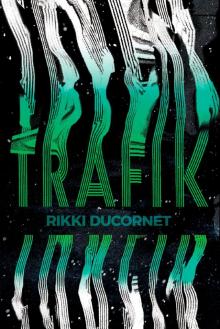- Home
- Rikki Ducornet
Trafik
Trafik Read online
PRAISE FOR BRIGHTFELLOW
“Ms. Ducornet’s novel about a man who ‘cannot fathom the bottomless secret of his own existence’ casts a lingering spell.”
— The New York Times
“In tracing the shape of what is left behind, Ducornet lends dignity to the universal plight of vanished illusions.”
—Los Angeles Times
“Bursting with vivid imagery, beautiful language, heartbreaking characters … Ducornet’s tale is unique and captivating.”
—Booklist
“A portrait of a surreal community that defies easy categorization… . An endless delight at the sentence level.”
—Kirkus
“Ducornet has written the oddest of varsity novels, one that anchors its charming caprice, philosophical fancy, and thriller-like pace to the psychological horror that lurks just beyond childhood innocence.”
—Publishers Weekly
PRAISE FOR RIKKI DUCORNET
“Ducornet is a novelist of ambition and scope.”
—The New York Times
“Linguistically explosive… . One of the most interesting American writers around.”
—The Nation
“Pick up a book by the award-winning Ducornet, and you know it will be startling, elegant, and perfectly formed.”
—Library Journal
“Storytelling that enchants the senses.”
—The Boston Globe
“Ducornet is a writer of extraordinary power, in whose books ‘rigor and imagination’ (her watchwords) perform with the grace and daring of high-wire acrobats.”
—BOMB
“Ducornet’s is a world of surfaces so rich and textured that notions of meaning and interpretation are subsumed under a lush and seductive prose that eventually inhabits readers’ minds.”
—The Millions
“Reveals strangeness in the most basic circumstances of life, flooding them in new light.”
—Kenyon Review
“Ducornet is a mad maestro of words.”
—Seattle Weekly
“Writer, poet, and artist Ducornet does things with words most authors would never even dream of.”
—Men’s Journal
“Rikki Ducornet is a magic sensualist, a writer’s writer, a master of language, a unique voice.”
—Amy Tan
“It is Rikki Ducornet’s magic to be able to coax an entire universe—’restless beyond imagining, a universe of rock and flame, whose nature is incandescence’—out of the modest and often grim contours of one man’s life.”
—Kathryn Davis
“Netsuke comes at the summit of Rikki Ducornet’s passionate, caring, and accomplished career. Its readers will pick up pages of painful beauty and calamitous memory, and their focus will be like a burning glass; its examination of a ruinous sexual life is as delicate and sharp as a surgeon’s knife. And the rendering? The rendering is as good as it gets.”
—William Gass
“Rikki Ducornet can create an unsettling, dreamlike beauty out of any subject. In the heady mix of her fiction, every-thing becomes potently suggestive, resonant, fascinating. She exposes life’s harshest truths with a mesmeric delicacy and holds her readers spellbound.”
—Joanna Scott
“Rikki Ducornet is imagination’s emissary to this mundane world.”
—Stephen Sparks, Point Reyes Books
TRAFIK
OTHER NOVELS BY RIKKI DUCORNET
Brightfellow
Entering Fire
The Fan-Maker’s Inquisition
The Fountains of Neptune
Gazelle
The Jade Cabinet
Netsuke
Phosphor in Dreamland
The Stain
TRAFIK
Rikki Ducornet
Copyright © 2021 by Rikki Ducornet
Cover art and design by Sarah Evenson
Book design by Rachel Holscher
Author photograph © Jaisri R. Lingappa
Coffee House Press books are available to the trade through our primary distributor, Consortium Book Sales & Distribution, cbsd.com or (800) 283-3572. For personal orders, catalogs, or other information, write to [email protected].
Coffee House Press is a nonprofit literary publishing house. Support from private foundations, corporate giving programs, government programs, and generous individuals helps make the publication of our books possible. We gratefully acknowledge their support in detail in the back of this book.
LIBRARY OF CONGRESS CATALOGING-IN-PUBLICATION DATA
Names: Ducornet, Rikki, 1943- author.
Title: Trafik / Rikki Ducornet.
Description: Minneapolis : Coffee House Press, 2021. | “A novel in warp drive.”
Identifiers: LCCN 2020052682 | ISBN 9781566896061 (paperback) | ISBN 9781566896122 (ebook)
Subjects: GSAFD: Science fiction.
Classification: LCC PS3554.U279 T73 2021 | DDC 813/.54--dc23
LC record available at https://lccn.loc.gov/2020052682
ACKNOWLEDGEMENTS
Translated by Anne McLean, From the Observatory is published by Archipelago Books.
Just about everything Al Pacino says has been said by Christopher Walken. When credited to Christopher Walken, the voice is the author’s.
PRINTED IN THE UNITED STATES OF AMERICA
28 27 26 25 24 23 22 21 1 2 3 4 5 6 7 8
For my son, Jean-Yves, and for Michael Lee, first readers. Thank you, dear friends, for the precious hours and the MUSIC!
But were mind immortal wont to change its bodies, how topsy-turvy earth’s creatures!
—LUCRETIUS
CONTENTS
CAKE AND CORTÁZAR
THE LIGHTS
ALONE WITH MIC
THE KYOTO APP
FUMEVAP
CONTACTS TO MOLECULAR
ON BEING
QUASI
EMU PARK
GOING ROGUE
SURFING THE ENDOCYCLIC QUASAR MASS
QUIVER DREAMS OF ALFA ASTRON
ONE MIGHT DO WELL TO MENTION THAT
BETWEEN
ONCE MORE MIC REFLECTS ON BEING MIC
BUT THEN
TELL ME ALL YOU WISH TO TELL ME
SAILING FASTER
LUCK
THE BRIGHTER ERG COMPACTION
QUIVER’S LONGING (AM LOCUS)
MARZIPAN TEA
GLADIOLUS
REMEMBER
LINGER LONGER
SOMETHING UNIQUE AND UNSCRUTABLE
A LUSTER
THE ENDOCYCLIC QUASAR MASS
ARRIVAL
MINDFUL DISTRACTIONS
COZY STREETS
A LIBRARY
CHRISTOPHER WALKEN ON BEES
TRAFIK
A NOVEL IN WARP DRIVE
CAKE AND CORTÁZAR
Sometimes Quiver feels so outside of everything, so peculiar, she catches herself scratching and poking her face in the manner of a caged monkey on the verge of insanity. She is doing this now, having left the Lights and making her way back to Home Free and Mic. As soon as he sees her, Mic offers her a slice of warm chocolate cake. Stove has baked it, but the icing is a molecular shuffle of his own inspiration. It has the tonguefeel (his word) of chocolate mousse— something she has never tasted.
Mic, having recently been introduced to the Kyoto App, is dressed like a geisha. Both of his lenticulars are punctuated with a dot. These, he explains, serve as a geisha’s eyebrows. Gratefully, Quiver eats the cake and then slips off to shower and nap. Shower massages her in all the right places, but this is a shallow comfort. Once an avatar from another galaxy had—by no fault of its own—entered the shower at the very moment she had climaxed. Quiver’s muffled cries were enough to send it packing. To her dismay, ther
e was no way she could coax it back. Such encounters happened all too rarely, and this avatar was unusually charming. It reminded her of Julio Cortázar, who, before he died, had the face of a lion. Cortázar, who wrote: The red headed night should see us walking with our face to the breeze. Just what, she wonders, is a breeze?
THE LIGHTS
Always at the start of First Cycle and before getting down to things, Quiver runs in the woods with the Lights. This time, as she had specified, there is an owl in each tree. Owls and a brook full of fish—similar to those she had encountered on the walls of tombs when, as a child, she visited the Nile River Valley within the Lights.
This cycle, and for the first time, she glimpses a girl with dazzling red hair who, as she runs past, gazes into her eyes with a crazy and unforeseen intensity. It occurs to Quiver that the girl is associated with the owls, that if she asks for owls each time, she will likely see her again. And she does. The following First Cycle, the girl streaks past directly in the path, her hair ablaze in the interstices of the leaves, her sudden face as vivid as a comet. Quiver thinks that if they were together, the moments would always quicken like this. Later she tells Mic about the owls and the fish, but for now keeps the redhead to herself. Overhead the Plonk Sidereal Atlas sparks with stars. They are approaching the Small Magellanic Cloud.
For Mic, the Lights are all about cities. City streets, the souks brimming with things of hammered copper and brass in stacks. Boxes of tools, ruined ceiling fans, wire, wrenches, screwdrivers, and brass tacks. Manhattan. Its orange and yellow taxis. Their bright bumpers. Elevators. Hollywood. Above all: Hollywood. When Quiver sleeps, he roams the Chateau Marmont. Lounges poolside. Becomes intimate with coffee makers, the showerheads, and majestic freezers. Mic adores the Chateau Marmont. And Al Pacino. His sprawling pad, its many faucets. Pacino’s faucets! His blender, his juicer!
ALONE WITH MIC
It was in space, alone with Mic, that Quiver came to fully appreciate her vanished lover, who, if vitalized and enhanced, was, as was she, nonetheless categorized as terrestrial. Her lover was the one who stood out among all the others— those who were memorable, who had taken form within a mother’s womb. She thinks of her lover’s immaculate feet, naked as fish, the fish she had seen in the Lights. Back in Home Free with Mic once again, she is longing for her lover and for her own self concurrently, the self she was in her lover’s proximity, her embrace.
Quiver is a transitional prototype. She had gestated in a dynamic carbon envelope that, suspended from a rack, swelled as she swelled, her umbilical cord fused to a vitamin sack. Row after row, the envelopes and the sacks hung in the air. It was said that they were festive—music for the eyes. She hates to think of it.
Transitionals such as Quiver were fraught, an irritable bunch at best. Which is why she travels with Mic. Mic is good in emergencies, as when she flips her fuses (his words). Always on the lookout, and at the end of Second Cycle, he downloads her dreams. Although rooted in simulations and threadbare memories, Quiver’s dreams are authentically hers. Mic keeps a careful record, and in this way knows when she is close to flipping. Mic, too, is volatile. And when he comes apart at the seams (her words), Quiver weighs in. It is in this way that they are considered right for one another.
To be clear, it must be said that both are most capable. Both had been trained for rare mineral reconnaissance and extraction, and to interact graciously in limited environments.
Mic has something of an old-world sensibility—likely due to his passion for terrestrial cinema, popular music, and, most recently, all things Japanese—a sensibility that Quiver finds precious. This Mic had picked up at once, yet what can he do? His Swift Wheel is packed with music and movies! These are what keep Mic motivated and happy. But in her worst moments, Quiver fears he had been hardwired to aggravate her. She fears they had been teamed up so that he could observe and document her descent into madness— always a possibility for even the most muscled prototypes.
Mic is well aware of her sensitivities and at his best understands and respects her ongoing need to turn to the Lights for solace. Her need to run in the woods, on the mountain trails and country roads of vanished places. He, too, is wired to so much that is (or had been) terrestrial. In this way they share a profound (and most likely essential) experience of the original planet.
THE KYOTO APP
Mic is short for Michelangelo (and not microphone— although a thumbnail-sized microphone is emblazoned on his minus end). When he stands at attention, his Swift Wheel humming, the display fume suspended before him, he percolates his way into whatever is going on. As when he wanders the souk of Aleppo, circa 1953, a discreet stowaway on a clueless couple’s honeymoon. Or transits to Vienna that same year. (He likes the fifties, the pressure cookers, toasters, Waring Blenders, Studebakers—that sexy front end!) He searches a wealth of material on Studebakers and succumbs to an ongoing and helpless crush, unable to speak of anything else until Quiver threatens him with a vinegar bath— vinegar one of Mic’s vulnerabilities ever since he had come close to perishing on a previous mission during a freak encounter with oscillating plasma clouds gorged with vinegar. They had returned to Elsewhere at once where he was polished within an inch of his life. When it was over, Quiver touched what stood for his shoulder with something like tenderness. His voice breaking, Mic had thanked her for what he called comforting me in a human way. Sometime later he had reached out to her similarly, patting her shoulder with that adaptable hand of his, eight fingers that could in a quik become a claw, a hammer, a rake, a set of tweezers, a bottle opener. The gesture was unforeseen. Quiver had shuddered so violently that Mic, looking into her eyes with those ever-shifting lenticulars of his—now green, now orange, now red—shed what was apparently a tear. Later she saw the tear gleaming on the floor beneath Food Face. Picking it up, she was surprised to see a small marble of cat’s-eye Jasper—the very thing the children of the Home Planet had prized in their games of bum-hole. Mic’s tear was the first and only marble Quiver would ever see. She kept it for a “rainy day”: a thing she knew but virtually, she kept it for “luck.”
The Kyoto App provides musical entertainment. Mic excels at clappers, gongs, flute, and drum; strings. As she nibbles her Newton Bar and sips her gigahertz mixer, he offers up a haunting melody. It conjures everything the Lights have taught her about the terrestrial night, tree frogs, and spring weather. As the music recedes, Mic recites from the Makura no Soshi:
It is night. Expecting a visitor, one is
startled by the sounds of rain striking
the shutters.
Thrust into agitation, Quiver sighs, sobs, shouts out, and—loses it. When she comes to, she is strapped into her hamok and must wheedle and cajole before Micosan agrees to her unbuckling. After, to make peace, he offers her a Francis Crick and a fragrant tea served in a replica raku tea bowl. The tea is soothing, and the Crick her favorite cracker. As she snacks, Mic screens her dream:
She is swimming in the ocean of an unknown planet’s atmosphere. She is a fish, a small orange carp, swimming among other fish—all mirrors of herself. Looking closely, she sees they are each fused in ice or, perhaps, glass. She, too, is immobilized within the glass, possibly immortal, in any case unreachable. Now she is somehow herself, Quiver, running down a garden path toward a charming building in a sea of sound: tree frogs, crickets, birds. Something unprecedented is about to happen.
The screen idle now, Quiver looks away and sees that Mic—in red pants and a red jacket with gold epaulettes—has taken on the colors and demeanor from another time entirely. A red pillbox hat is poised on what serves as his head, and his flashing lenticulars convey pleasure in what is clearly the outcome of a carefully considered determination. He proposes a deal. If she says nothing about this, he will not inform Elsewhere about her recurrent breakdowns.
“But, don’t they see it all?” Quiver asks. “I thought—”
“For some time now,” he tells her, “Base sees nothing but a scramble of statik
.”
“Wow! But, Mic! What are you?”
“A bellhop! A bell would ring and he, looking divine, would hop to it! Just like a bot!” He executes a series of near somersaults in place, filling Home Free with the sounds of bells of all kinds, sounds she had never before heard: kitchen oven timers, egg timers, alarm clocks, dinner bells, cowbells, church chimes, horse-and-buggy bells, elephant and goat bells, cat bells—until she shouts “LAY OFF MIC!”— only to be outdone by the Plonk Sidereal Atlas, its voice rising above hers, if somewhat incoherently announcing that they are closing in on Quasi. Closeting Quasi! it rumbles: Closeting!
In this way, on they go together, Micosan and Quiver, deeper into the incomprehending night, deftly avoiding a sudden sea of leaking protons and always into the ineffable future.
FUMEVAP
A new cycle begins. Here she is, once again, grappling with a malfunctioning fumevap. The task is hers, because the fumes—such as they are (a discreet fart now and then, for forking sake!)—are hers. It is rare that Mic’s pankwizer scorches, you see, and even when it does, its funk is nearly imperceptible. Periodically, however, Mic tumbles into a radical metaphysical mood, his botsplaining accumulating exponentially. He will say:
“A bot never passes fumes!”
He will say: “You cannot fix your own forking fumevap!”
It is true that the fumevap often refuses to cooperate. But from farts to fumevaps, Mic leaps to diesel engines, factory chimneys, the bombing of the souk in Aleppo, the demise of movie palaces—and this thanks to a TRAGICALLY FLAWED DIGESTIVE APPARATUS COMPROMISED BY MELANCHOLY, UNFULFILLED ASPIRATIONS, AT THE MERCY OF ALLERGENS, BACTERIAL INFECTIONS, FOOD POISONING, PARASITES, FAILING TEETH, THE RIDICULOUS STOMACH, UNTRUSTWORTHY GALL BLADDER, OUTRAGEOUS RECTUM, AND THE PESKY ESOPHAGUS!

 Trafik
Trafik The Fan-Maker's Inquisition
The Fan-Maker's Inquisition Netsuke
Netsuke Brightfellow
Brightfellow